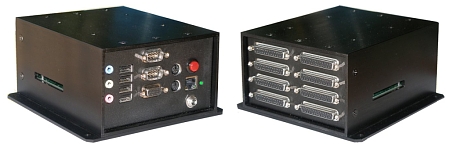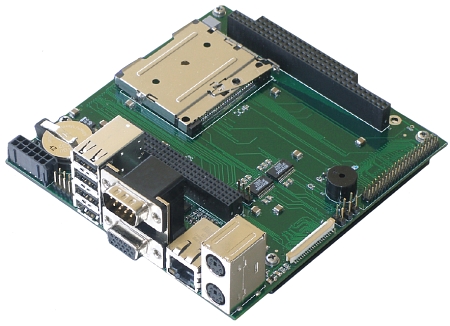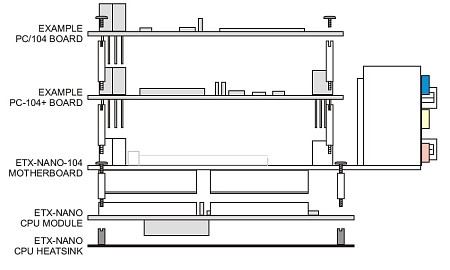Mini system combines Core Duo, ETX, PC/104
Sep 21, 2007 — by LinuxDevices Staff — from the LinuxDevices Archive — 10 views Acces I/O has announced what's claimed to be one of the smallest complete embedded systems featuring a Core Duo processor. The NANO I/O Server CD employs the company's innovative ETX-NANO-104 baseboard, combining an ETX processor module with PC/104-Plus expansion.
Acces I/O has announced what's claimed to be one of the smallest complete embedded systems featuring a Core Duo processor. The NANO I/O Server CD employs the company's innovative ETX-NANO-104 baseboard, combining an ETX processor module with PC/104-Plus expansion.

The NANO I/O Server CD
(Click to enlarge)
Stretching the 4.7 x 4.7 inch nano-ITX form-factor just slightly, the NANO I/O system's motherboard measures 4.9 x 4.7 inches. It's housed in a black-anodized aluminum enclosure measuring 6.25 x 5 x 3 inches. The system is powered by a 12VDC-to-ATX power supply and is said to run silently, since it requires only passive cooling.

The ETX-NANO-104 motherboard
The ETX-NANO-104 features a standard VGA monitor port, PS/2 keyboard and mouse connectors, and a serial port. These are mounted on the rear of the motherboard along with 3.5 mm jacks for audio in and out. Additionally, the board is said to have onboard connectors for a second serial port, IDE, flat panel support, and CompactFlash. Accordingly, the NANO I/O Server CD has a cutout in its side so CompactFlash cards can be inserted.
Not visible in the above photo is the bottom of the motherboard, which is where the system's removable ETX processor module resides. Acces claims the system can utilize “any embedded ETX CPU board that meets the ETX standard for its processing.”
The diagram below shows how the ETX-NANO-104 motherboard stacks with an ETX processor module and PC/104 (or PC/104-Plus) I/O expansion modules.
How the ETX-NANO-104 motherboard stacks with ETX (below) and PC/104 (above)
(Click to enlarge)
A diagram showing the top view of the ETX-NANO-104 appears here.
The company offers three ETX processor module choices of its own:
- A 1.66 GHz Core Duo L2400 processor module offers up to 2 GB of RAM, a 667 MHz front side bus, and a 2 MB second-level cache
- An 800 MHz Celeron M processor module with 82855GME chipset, up to 1 GB of RAM, and a 400 MHz front side bus
- A 500 MHz AMD Geode LX800 with up to 1 GB of RAM
While the combination of ETX processor modules and a nano-ITX style form-factor is unusual, Acces justifies its design decision by suggesting that with the Core Duo processor on board, the device can perform ten times faster than a typical nano-ITX computer. It also nominates the NANO I/O Server CD “for simple and easy prototyping.”
The ETX-NANO-104's internal flat panel connector supports either an LVDS or LCD display, depending on what ETX module is chosen. However, the other capabilities listed for the NANO I/O Server CD appear to be similar across the board.
The system accepts PC/104-Plus I/O expansion modules in an upward stack. It's also said to accommodate a 2.5-inch IDE or SATA hard drive.
Other touted system I/O and mechanical features and specifications include:
- Networking — 10/100 Ethernet
- Other I/O:
- VGA output
- 4 x USB 2.0 ports
- 3.5 mm jacks for audio line in, line out, microphone
- PS/2 keyboard and mouse ports
- 2 x serial ports — 1 x RS-232, 1 x RS-232/422/485
- 44-pin IDE connector
- VGA output
- Expansion:
- side-mounted CompactFlash socket, with ejector housing
- PC/104-Plus expansion, including both ISA and PCI bus stack-up connectors
- Standard ETX-specified Hirose connectors
- side-mounted CompactFlash socket, with ejector housing
- External dimensions — 6.25 x 5.0 x 3.0 inches (159 x 127 x 76 mm)
An Acces spokesperson said the NANO I/O Server CD supports operating systems that include Linux, Windows CE, and Windows XP/2000/Vista, any of which can booted from either a CompactFlash card or from a 2.5-inch hard drive. Presumably Windows XP Embedded is also usable.
Naturally dependent on the choice of ETX module, memory, and I/O boards, pricing starts at “under $1,500.” The NANO I/O Server CD is said to be available now.
This article was originally published on LinuxDevices.com and has been donated to the open source community by QuinStreet Inc. Please visit LinuxToday.com for up-to-date news and articles about Linux and open source.
